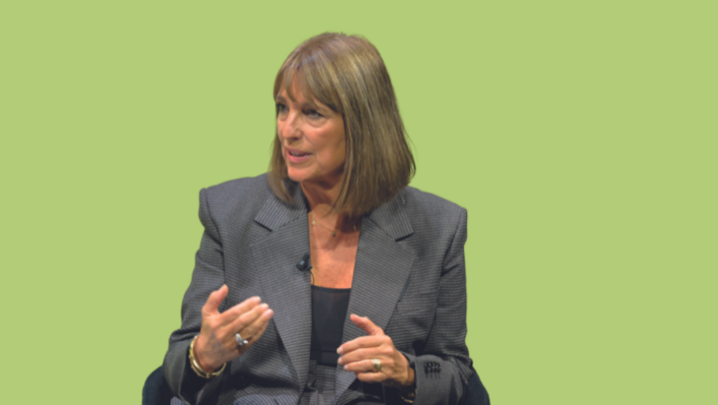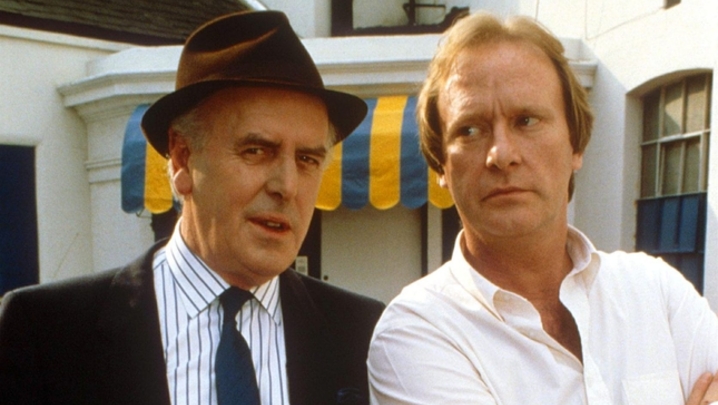ITV’s ambitious, all-star, six-part reframing of spy story The Ipcress File is a total treat, says Caroline Frost.
West Berlin, 1963. A young man picks up a familiar-looking pair of glasses from his bedside table to look at a beautiful woman taking a bath. Soon after, he picks up a newspaper, pausing to draw a moustache on a picture of President de Gaulle. The detail is rich, evocative and clear evidence of ITV’s determination that its engrossing new big-budget six-parter, The Ipcress File will both pay respectful tribute to the acclaimed 1965 film, but also find a fresh audience on its own merits.
The themes of Len Deighton’s famous spy novel are as pertinent today as they were when Michael Caine first appeared on screen as criminal wide boy turned government agent Harry Palmer all those years ago. As showrunner and director James Watkins, who previously co-created McMafia, explains, “There’s a great sense of social mobility. Harry Palmer is fighting against class, [while CIA agent] Maddox is fighting against racism, and there’s a glass ceiling that [Harry’s colleague] Jean is looking at. All those things resonate.”
For writer John Hodge (Trainspotting, The Beach, The Program), the appeal and also the challenge lay in adapting Deighton’s first-person novel and broadening his canvas across six television hours. He wondered: “Where can we take this? How do we broaden it out and look into other characters’ lives for more of an ensemble piece?” The answer, it seems, is in Deighton’s great wit and warmth. “Spy stories can be grim,” says Hodge, “but a feeling of humanity permeates his work. In the small moments, there is human weakness, human strength.”
Key to the success of the whole enterprise (produced by Altitude Television in association with ITV Studios) is the casting of Harry Palmer, a man Watkins describes as “a winner who comes across as a loser”. He adds: “He’s a man aware that the whole world is skewed against him, and he uses humour as a weapon.”
From the show’s very first scenes, it is clear that producers have struck gold with Joe Cole, previously best known for playing young John Shelby in Peaky Blinders. For the “tough exterior, softer inside” he gives to Palmer, Cole reveals: “I wasn’t too familiar with Harry, but he’s not too far from home for me. It’s an amalgamation of me and the character.”
As for the shadow of that 1965 big-screen, era-defining interpretation, Cole did his best to dodge it. “I wanted to put my own spin on it,” he explains. “When I watched the movie, I started worrying I’d do a Michael Caine impersonation without realising it. I quickly tried to erase that from my memory and go on instinct.”
It seems those famous glasses were not so easy to dodge: “I went to the opticians, tried on every pair in the shop and one pair looked right. It was very important to get those right. It does a certain amount of work for you when you can hide behind a good pair of spectacles.”
Alongside Cole in the early scenes where he is introduced to his new world of espionage, is Tom Hollander, on enigmatic form as section head Major Dalby. The pair’s chemistry is electric, bringing out the unlikely similarity of two such characters, despite their utterly different backgrounds. Hollander reflects: “They each have an ironic relationship to their own predicament. They’re class enemies but they’re actually dancing on the same pinhead, both restricted by their job and the world they’re in.”
It seems the double-guessing extended off-screen during the shoot, including the very first scene the pair played together. Cole remembers: “I had a preconception of how I was going to play it, but then I got in the room with Tom, who’s such a heavyweight. I thought, ‘Tom will see through anything I try and do here.’”
Fighting her own battles is Jean Courtney, tasked with managing Palmer’s antics on the ground, a world away from the drawing rooms where her mother expects her to settle down and make a good match. Playing her as cool as a cucumber is Lucy Boynton, previously seen as Freddie Mercury’s love Mary in Bohemian Rhapsody.
In a role significantly expanded from Deighton’s book, Jean personifies many a smart young woman of 1963, struggling to get ahead in the male-dominated world of international espionage. “It is a fascinating world to explore through Jean’s eyes,” says Boynton, “this world we continue to be so fascinated by, this so-called era of liberation. But she uses that societal underestimation of young women to her advantage.”
Jean also works with Maddox, an African-American young man who has already climbed up through several ranks of the CIA. Ashley Thomas, who plays him, delights in Maddox’s very first line, “Yes, that’s right. I’m black,” as it sets the tone for exactly who Maddox is. Thomas reflects: “He’s a very capable man, at a time when, because of the state of society, black men weren’t given those opportunities. He’s in a position of power, and he’s going to have to be very good if not better than his counterparts.”
With so many battles, both personal and political, taking place, Hodge has much to feast on. “It’s a fascinating era,” the writer agrees. “A time of social mobility; sex had just been invented in Britain, according to Philip Larkin, and we were about to enter an era of four prime ministers who had all been to state schools. There was a sense of society opening up, but there was also the threat of nuclear annihilation. Lots of things to work with.”
Indeed, a whole series suddenly doesn’t seem so long, after all. The adaptation also takes the characters abroad to Finland, the US and Lebanon – in contrast to the film, which stayed firmly in London. “The six hours affords these characters journeys where you mark a different place from, say, a James Bond film,” says Watkins. “There was a lot of real estate there to open up. But we didn’t want a Bond travelogue. Harry Palmer is a real person, he wants to reclaim his expenses. It’s all about the elucidation of these characters.”
The show is palpably epic, though, both in style and structure, on a par with Watkins’ previous projects. As well as McMafia, he directed The Woman in Black for the big screen and an episode of Black Mirror. He waxes lyrical about the production design of The Ipcress File, everything from the bleached colour palette to the roughness of the woollen clothes. “We were trying to keep a dirtiness to it,” he says. “You’re looking at everything askew, the horizon line is always shifting. The off-kilter angles have a Third Man influence. It’s all contributing to a sense of things not being quite as they should be.”
For Kevin Lygo, ITV’s Managing Director of media and entertainment, Hodge’s adaptation, plus the idea of Joe Cole in the lead role, made Ipcress a very attractive proposition. “The script was so good, it leapt off the page,” he says. “It was a terribly easy commission. The budget was going to be an issue because it had such ambition – we are not Netflix, so that was where other partners came in.”
In addition to ITV Studios, other backers include the Liverpool Film Office, Lipsync, Filmgate and the Finnish national and regional film funds.
This begs the question of how best to market a show that looks so much bigger than your average ITV drama. Lygo accepts that he has a big task ahead: “It’s incumbent on us to market it slightly differently. It’s not a standard ITV show. It needs a special event.”
He groans at the inevitable compliment that The Ipcress File looks so good that it must surely be the next big-budget offering from a deep-pocketed streamer. “People say it looks like a big Netflix thing, which is incredibly annoying,” he admits. “But I do know what they mean.”
The Ipcress File will air on ITV in March.
Photo credit: ITV






